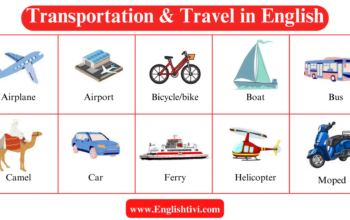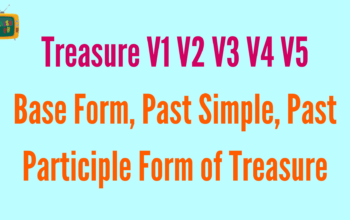Depart V1 V2 V3 V4 V5 is one of the verbs that are used very commonly in English tests as well as in everyday communication. Also, because it’s an irregular verb, depart doesn’t follow the regular rule. The verb “depart” has five different forms: base form, past simple, past participle form, present perfect, and present perfect participle. So what is depart‘s past? How do conjugate verbs with depart verbs?
⏩ Sign Up to Get Bonus
Let’s find out with English tivi in the article below.
See more at: Verbs
Depart of Definition and Meaning
Depart is a verb meaning to leave. It can also mean to go away from, in the sense of “to depart from one's usual place or condition.”
V1 V2 V3 V4 V5 Form of Depart
| Base Form (V1) | depart |
| Past Form (V2) | departed |
| Past Participle Form (V3) | departed |
| s / es/ es (V4) | departs |
| ‘ing’ form (V5) | departing |
Depart of Past Simple V2
The verb Depart is also employed in its V2 form as “departed”’. It is used to indicate the past tense in sentences.
Depart of Past Participle V3
The V3 form is identical to the V2 form. The V3 form is “departed”. Departed is used in the past or present perfect tense.
+ In the present perfect tense, we use the word V1 as ‘have + departed‘ or ‘has + departed'.
- I, you, and we are used as ‘have + departed‘.
- ‘has + departed' is used for he, she, and it.
+ If you need to use the past perfect tense, use ‘had + departed‘ regardless of the subject.
You might also like: ALL the English Grammar Basics You Need
Conjugation of Depart V1 V2 V3 V4 V5
Conjugation table: Depart | |||
| Number | Singular | ||
| Present Simple of depart | I | You | She/He/It |
| depart | depart | departs | |
| Plural | |||
| We | You | They | |
| depart | depart | depart | |
| Present Continuous of depart | I | You | She/He/It |
| am departing | are departing | is departing | |
| Plural | |||
| We | You | They | |
| are departing | are departing | are departing | |
| Present Perfect of depart | I | You | She/He/It |
| have departed | have departed | has departed | |
| Plural | |||
| We | You | They | |
| have departed | have departed | have departed | |
| Present Perfect Continuous of depart | I | You | She/He/It |
| have been departing | have been departing | has been departing | |
| Plural | |||
| We | You | They | |
| have been departing | have been departing | have been departing | |
| Past Simple of depart | I | You | She/He/It |
| departed | departed | departed | |
| Plural | |||
| We | You | They | |
| departed | departed | departed | |
| Past Continuous of depart | I | You | She/He/It |
| was departing | were departing | was departing | |
| Plural | |||
| We | You | They | |
| were departing | were departing | were departing | |
| Past Perfect of depart | I | You | She/He/It |
| had departed | had departed | had departed | |
| Plural | |||
| We | You | They | |
| had departed | had departed | had departed | |
| Past Perfect Continuous of depart | I | You | She/He/It |
| had been departing | had been departing | had been departing | |
| Plural | |||
| We | You | They | |
| had been departing | had been departing | had been departing | |
| Future Simple of depart | I | You | She/He/It |
| will/shall depart | will/shall depart | will/shall depart | |
| Plural | |||
| We | You | They | |
| will/shall depart | will/shall depart | will/shall depart | |
| Future Continuous of depart | I | You | She/He/It |
| will/shall be departing | will/shall be departing | will/shall be departing | |
| Plural | |||
| We | You | They | |
| will/shall be departing | will/shall be departing | will/shall be departing | |
| Future Perfect of depart | I | You | She/He/It |
| will/shall have departed | will/shall have departed | will/shall have departed | |
| Plural | |||
| We | You | They | |
| will/shall have departed | will/shall have departed | will/shall have departed | |
| Future Perfect Continuous of depart | I | You | She/He/It |
| will/shall have been departing | will/shall have been departing | will/shall have been departing | |
| Plural | |||
| We | You | They | |
| will/shall have been departing | will/shall have been departing | will/shall have been departing | |
| Conditional Present of depart | I | You | She/He/It |
| would depart | would depart | would depart | |
| Plural | |||
| We | You | They | |
| would depart | would depart | would depart | |
| Conditional Perfect of depart | I | You | She/He/It |
| would have departed | would have departed | would have departed | |
| Plural | |||
| We | You | They | |
| would have departed | would have departed | would have departed | |
| Conditional Present Continuous of depart | I | You | She/He/It |
| would be departing | would be departing | would be departing | |
| Plural | |||
| We | You | They | |
| would be departing | would be departing | would be departing | |
| Conditional Perfect Continuous of depart | I | You | She/He/It |
| would have been departing | would have been departing | would have been departing | |
| Plural | |||
| We | You | They | |
| would have been departing | would have been departing | would have been departing | |
| Present Subjunctive of depart | I | You | She/He/It |
| depart | depart | depart | |
| Plural | |||
| We | You | They | |
| depart | depart | depart | |
| Past Subjunctive of depart | I | You | She/He/It |
| departed | departed | departed | |
| Plural | |||
| We | You | They | |
| departed | departed | departed | |
| Past Perfect Subjunctive of depart | I | You | She/He/It |
| had departed | had departed | had departed | |
| Plural | |||
| We | You | They | |
| had departed | had departed | had departed | |
| Imperative of depart | I | You | She/He/It |
| depart | |||
| Plural | |||
| We | You | They | |
| Let’s depart | depart | ||
See more at: Vocabulary
Example Sentences with Depart V1 V2 V3 V4 V5
In this section, we will learn about depart sentence examples:
- At 8 p.m., the last flight to Chicago departs.
- My picture departed from what the jury members had already constructed in their minds.
- Clearly, the country has departed from this modest route repeatedly – and cumulatively – during the last half-century.
- I will depart for Japan at 8 am.
Synonym Words For Depart
Synonym of depart word list. Here are a variety of words whose meaning is nearly the synonym of depart:
- leave
- go
- retreat
- evacuate
- exit
- part
- decamp
- retire
- escape
- withdraw
- bolt
- desert
- flee
- bail
- begone
Opposite Words For Depart
The antonym of depart word list. Here are some words that have nearly the opposite meaning as depart:
- stay
- remain
- settle
- await
- dwell
- linger
- reside
- rest
- wait
- abide
- bide
- dally
- endure
- hang
You might also like: Best List of Irregular Verbs in English
Some Frequently Asked Questions About Depart (Verb)
What is the V1 V2 V3 V4 V5 of depart?
The past tense of depart is departed. The third-person singular simple present indicative form of depart is departs. The present participle of depart is departing. The past participle of depart is departed.
| Base Form (V1) | depart |
| Past Form (V2) | departed |
| Past Participle Form (V3) | departed |
| s / es/ es (V4) | departs |
| ‘ing’ form (V5) | departing |
What is the V2 and V3 form of depart?
+ The V2 and V3 form of depart is “departed“.
What is the sentence of depart?
What is the past tense V2 of depart?
+ The past tense of depart is “departed“.
What is the past participle V3 of depart?
+ The past participle of depart is “departed“.
What is the present participle V5 of depart?
+ The present participle of depart is “departing“.
Conclusion
Let’s learn with English TV the structure of the verb “Depart V1 V2 V3 V4 V5“: Base Form, Past Simple, Present Continuous and Present Continuous and Present Continuous and Present Continuous forms. We wish you all the best of luck.
You should subscribe to the English TV YouTube channel if you want to learn more about the English language and improve your proficiency.





